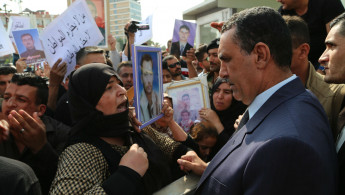Iraq to investigate disappearance of Arabs arrested by Kurds
Iraqi Prime Minister Haider al-Abadi has ordered an investigation after dozens of complaints from Arab families who say their relatives have not been heard from since their arrest by Kurdish forces.
Kurds control an autonomous region in northern Iraq and also held the disputed province of Kirkuk from 2003 until they were driven out last month by Iraqi forces with little resistance after Baghdad rejected an independence referendum.
Since then, hundreds of Iraqis have demonstrated in Kirkuk city calling for human rights bodies to shed light on the disappearances of relatives arrested by Kurdish forces.
"Two thousand people have been arrested since 2003," Khaled al-Mafarji, an Arab MP from Kirkuk, told AFP.
On Tuesday 74 complaints were filed concerning missing relatives, the Human Rights Committee of Kirkuk province said.
A protest was held on the same day in which relatives of the missing appealed directly to Abadi to intervene to locate their loved ones.
"The prime minister has ordered investigations as demanded by the families of those arrested by Kurdish Asayesh members in Kirkuk province in order to know their fate," Abadi's office said later in a statement, referring to the Kurdish security services.
One of those demonstrating on Tuesday, Najm al-Shahri, said Kurdish security forces arrested his son at home in 2007, when he was 17 years old.
Shahri said his son had been accused of "attacking US forces" who had intervened in Iraq three years earlier, leading to the downfall of dictator Saddam Hussein.
He said he wanted only one thing: "The body of my son or information about his fate".
A senior Kurdish security official told AFP that any arrests were "measures taken to enforce the law".
"We are ready to answer any questions from Prime Minister Abadi," said the official, who spoke on condition of anonymity.





 Follow the Middle East's top stories in English at The New Arab on Google News
Follow the Middle East's top stories in English at The New Arab on Google News
![Israeli forces ordered bombed Gaza's Jabalia, ordering residents to leave [Getty]](/sites/default/files/styles/image_330x185/public/2176418030.jpeg?h=a5f2f23a&itok=_YGZaP1z)

